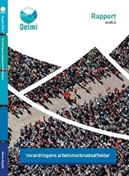Based on theoretical and empirical literature, the authors seek answers to the question of how migration affects internationalization in the form of foreign trade, off-shoring and foreign direct investment, and in which direction. The authors also identify ambiguities and shortcomings in the literature and what these are due to. Last but not least, they describe the research front and ask how migration and integration policy measures as well as other policy changes can improve migrants' potential to benefit the Swedish business community.
Some overall conclusions and recommendations
- An increase in the number of migrants is linked to an increase in foreign trade. A one percent increase in the number of migrants is linked to 0.1–0.2 percent more foreign trade on average.
- Surveys indicate that companies increase their exports by 1–3 per cent for every additional foreign-born person employed. If companies mainly trade in complex products, exports can increase more than that. Migrants seem to be particularly associated with trade in services and offshoring.
- Migrants' potential as promoters of internationalization is partly because they bring new knowledge and contacts to the companies. Educated migrants promote trade the most.
- Enterprise policy should encourage foreign-born entrepreneurs to invest in industries that are more oriented towards other countries and to make migrants aware of the potential of business in general in business.
About the report authors
The report, Migration and companies' internationalization (2015: 4), is written by Andreas Hatzigeorgiou, PhD in economics and works at the research institute Ratio and the Stockholm Chamber of Commerce, and Magnus Lodefalk, PhD in economics and researcher at the Örebro University School of Business.
Picture by rus-burkhanov from Pixabay.





